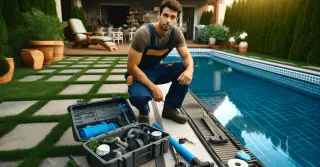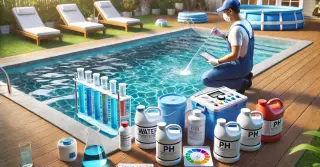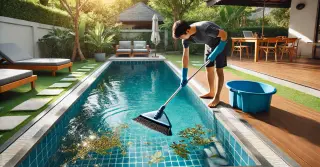Routine pool maintenance is vital for ensuring a clean, safe, and pleasant swimming environment. Neglecting maintenance can lead to issues like algae growth, cloudy water, and equipment malfunctions. By following a regular maintenance schedule, you can prevent these problems and ensure a healthy pool.
Key Cleaning ActivitiesMaintaining a clean pool requires routine cleaning tasks. These tasks help remove debris, prevent algae growth, and keep the water clear.
- Skimming and Brushing: Consistent skimming removes leaves, insects, and other floating debris from the pool's surface. This prevents debris from settling and causing water quality issues. Brushing the pool walls and floor clears dirt, algae, and buildup that can cause stains and slippery spots. Routine skimming and brushing keep your pool looking its best and prevent algae growth.
- Bottom Cleaning: Using a pool vacuum to clean the bottom removes dirt and debris that has settled to the bottom. Using an automatic pool vacuum makes this easier, but manual vacuuming is sometimes needed for a deep clean. Routine vacuuming ensures clear water and prevents debris accumulation.
Maintaining Water ChemistryMaintaining balanced pool water is essential for swimmer safety and comfort. Balanced chemicals inhibit algae, bacteria, and contaminants, and safeguard pool surfaces and equipment.
- Testing and Adjusting: Consistently testing the pool water to measure chlorine, pH, alkalinity, and calcium hardness is crucial. Adjust chemicals as necessary to keep the water balanced. Using a dependable test kit ensures accurate measurements, so you can make necessary adjustments.
- Regular Shocking: Shock treatments add a high dose of chlorine to the pool to kill bacteria, algae, and other contaminants. This is important after heavy use or significant weather events. Frequent shocking maintains water cleanliness and safety.
Filter MaintenanceThe pool's filtration system is essential for maintaining clean water. Regular maintenance of the filter maintains its efficiency.
- Cleaning Filters: Depending on your filter type—cartridge, sand, or diatomaceous earth—cleaning methods differ. Cartridge filters need to be removed and hosed down to remove dirt and debris. Sand and DE filters need backwashing to clean trapped particles. Regular filter cleaning maintains smooth operation and clear water.
- Filter Media Replacement: Filter media will require replacement over time. Sand in sand filters should be replaced every 3-5 years. Cartridge filters must be replaced every 1-2 years. DE filter grids should be replaced every 3-5 years. Consistently replacing filter media ensures optimal filtration and water quality.
Regular pool maintenance is essential for a clean, safe, and enjoyable swimming experience. By implementing a regular maintenance plan, you can keep your pool in top shape for years to come.



